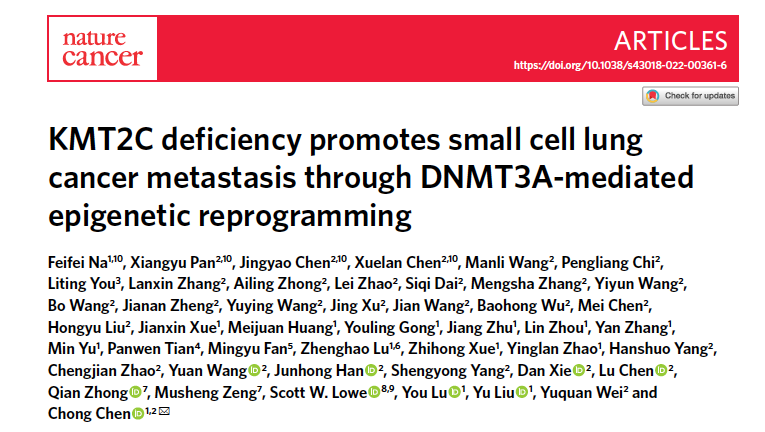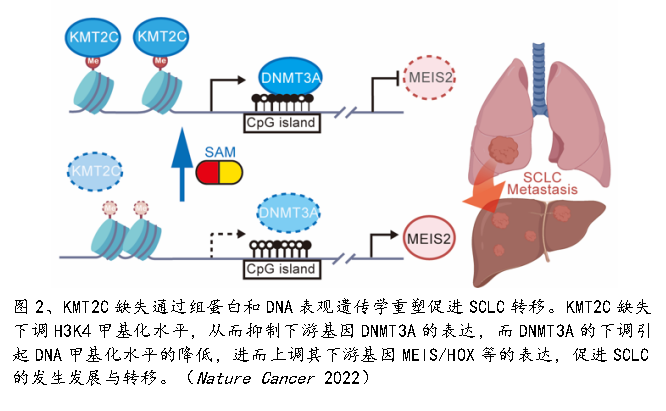The research team of Prof. Chong Chen at the State Key Laboratory of Biotherapy and Cancer Center, West China Hospital has published in Nature Cancera research paper entitled “KMT2C deficiency promotes small cell lung cancer metastasis through DNMT3A-mediated epigenetic reprogramming”. The paper clarifies the epigenetic mechanism of histone methyltransferase KMT2C deletion promoting the distal metastasis of SCLC through histone DNA synergistic hypomethylation, which has certain theoretical significance for the treatment of SCLC.

Distal metastasis is the main cause of cancer deaths. SCLC is one of the most metastatic tumors among human tumors. At the time of diagnosis, more than 70% of SCLC patients have metastasis, so they cannot be treated surgically, which also leads to the lack of research materials. To this end, Chong Chen’s team created a new type of "accurate tumor model". The model is highly similar to the pathological characteristics and gene expression of clinical patients, and shows extensive invasion and metastasis.
“Small cell lung cancer (SCLC) is notorious for its early and frequent metastases, which contribute to it as a recalcitrant malignancy. To understand the molecular mechanisms underlying SCLC metastasis, we generated SCLC mouse models with orthotopically transplanted genome-edited lung organoids and performed multiomics analyses. We found that a deficiency of KMT2C, a histone H3 lysine 4 methyltransferase frequently mutated in extensive-stage SCLC, promoted multiple-organ metastases in mice. Metastatic and KMT2C -deficient SCLC displayed both histone and DNA hypomethylation. Mechanistically, KMT2C directly regulated the expression of DNMT3A, a de novo DNA methyltransferase, through histone methylation. Forced DNMT3A expression restrained metastasis of KMT2C-deficient SCLC through repressing metastasis-promoting MEIS/HOX genes. Further, S-(5′-adenosyl)-L-methionine, the common cofactor of histone and DNA methyltransferases, inhibited SCLC metastasis. Thus, our study revealed a concerted epigenetic reprogramming of KMT2C - and DNMT3A -mediated histone and DNA hypomethylation underlying SCLC metastasis, which suggested a potential epigenetic therapeutic vulnerability.

The co first authors of the article are Dr. Feifei Na and Dr. Jingyao Chen from theDepartment of Thoracic Oncology,West China Hospital of Sichuan University, and doctoral students Xiangyu Pan and Xuelan Chen from the State Key Laboratory ofBiotherapy and Cancer Center, West China Hospital; and Prof. Chong Chen is the corresponding author. Yuquan Wei, an academician of CAS, provided guidance for the work.This work was supported by the National Key R&D Program of China (2017YFA0505600, C.C.), the National Natural Science Foundation of China (81522003, 82170171, 81770157 and 81570150, C.C.; 81570150, F.N.; 8210102196, J.C.), the Sichuan Science and Technology Program (2020YFQ0059, 2020ZYD002, 2018JZ0077 and 2017TJPT0005, C.C.) and the 1.3.5. Project for Disciplines of Excellence, West China Hospital, Sichuan University (C.C.).
Chong Chen's team has long studied the mechanism of tumor epigenetics. It found several epigenetic tumor suppressor genes such as KMT2C and PHF23 in its early stage of research, and relevant findings were published in Nature, Cancer Discovery, Cancer Cell,STTT and so on.
Link:https://www.nature.com/articles/s43018-022-00361-6
